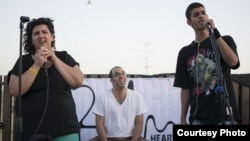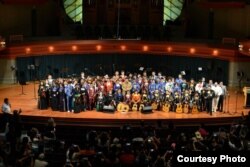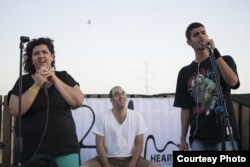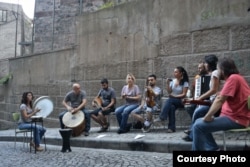Three years ago, violinist Madison Koen attended a Mariachi camp at the University of North Texas.
"I didn’t know anything about the music, and so I came to it just because I thought it was beautiful.”
Though he has no Hispanic background, Koen was so fascinated by the music that he continued learning about it and what it means to young Hispanics in the United States.
“I found that people there were very accepting and I found a sense of community playing Mariachi,” he said. “A lot of the kids found Mariachi music part of their identity. Hearing the music and performing the music has really motivated me to develop my fluency in Spanish and to read more about where this music came from.”
Koen’s experience at the Mariachi camp is just one story that musician, author and filmmaker Osseily Hanna explores in his documentary and book, Music and Coexistence: A Journey across the World in Search of Musicians Making a Difference.
“The Mariachi program at the University of North Texas brings together not only young Mariachi musicians from Hispanic descent, but also from non-Hispanic descent,” said Hanna, who spent three years traveling the globe, listening to and interviewing musicians who are breaking boundaries or creating a ray of hope with their voices and instruments.
The primary question driving his research is simple. Can music help bridge gaps between people?
"It’s a wonderful way for these young people getting engaged in something positive to learn about a rich culture that’s so present in the United States,” he said.
In Israel, Hanna met Heartbeat, an ensemble of young Palestinians and Jewish Israelis who come together to play music. He said there is another dimension, however, to their rehearsals and performances.
“Now, part of what they do is they’re addressing political issues through their music. They are talking about day-to-day problems they face,” said Hanna.
That’s also what a Turkish group called Kardeş Türküler [Songs of Fraternity] is doing.
“Twenty-five years ago in Turkey, it was prohibited to sing in any of the languages that are part of what Turkey is," said Hanna. "I’m talking about Armenian and Kurdish as examples. What this group did is in 1993, they started singing in these languages. Why is that important? Because actually there are millions of people that live in Turkey that should have their right to express themselves in the language they choose.”
Aimé Ndorimana, a Rwandan musician with HIV, uses music to overcome the stigma surrounding the virus. He said people with HIV, especially children, live in isolation. He invites them and other people in the community to come together to play music, sing and dance.
“Everyone can get connected,” said Ndorimana. "I can say people who stigmatize others; music can play a role of passing messages so that people stop stigmatizing others. That’s why we use music to change everything related to HIV/AIDS.”
Hanna chronicles stories like that from around the world: a former child soldier in Cambodia starts a program to revive traditional music following the genocide in the 1970s; in Kosovo, a rock-and-roll school provides a peaceful environment for Christian and Muslim children to compose and perform together; Albino musicians in Tanzania combat persecution by local shamans by performing traditional music; Brazilian artists use music to overcome social and economic barriers.
“Sao Paulo [Brazil] is a mega city,” Hanna noted. “Outside of the city has a slum, which in Portuguese is favela. So you’ve got those young people living in the favela, they got risk of being shot. There is a lot of violence there.
"So what they do is they created a refuge to invite not only young musicians from the favela to create music, but there are also people from the city. While there is no physical barrier like in Kosovo, there is an economic one. They are talking about what’s going on, not complaining about their reality; they are facing their reality through music, through composing, through recording,” he said.
Hanna said when people play music together, each has a space and a moment to express themselves and have their voice heard. So a "jam session" not only helps to create coexistence, playing music is in itself an act of creative coexistence.








